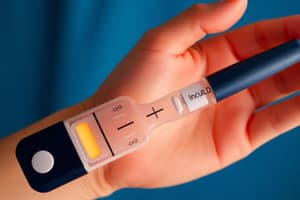Podcast
Questions and Answers
What is the primary mechanism leading to hyperglycemia in diabetic ketoacidosis (DKA)?
What is the primary mechanism leading to hyperglycemia in diabetic ketoacidosis (DKA)?
- Increased insulin secretion
- Increased peripheral glucose uptake
- Decreased renal glucose reabsorption
- Insulin deficiency (correct)
How does hypovolemia contribute to acute kidney injury (AKI) in patients with DKA?
How does hypovolemia contribute to acute kidney injury (AKI) in patients with DKA?
- By promoting capillary permeability
- By inducing renal tubular obstruction
- By causing renal blood flow reduction (correct)
- By increasing blood pressure significantly
Which metabolic change is characteristic of diabetic ketoacidosis?
Which metabolic change is characteristic of diabetic ketoacidosis?
- Metabolic alkalosis with decreased anion gap
- Anion gap metabolic acidosis (correct)
- Respiratory acidosis with normal anion gap
- Lactic acidosis with elevated bicarbonate levels
What role does insulin play in regulating potassium levels in DKA?
What role does insulin play in regulating potassium levels in DKA?
Which of the following acids contribute to the metabolic acidosis observed in DKA?
Which of the following acids contribute to the metabolic acidosis observed in DKA?
What happens to potassium levels in the body during DKA, despite initial serum levels appearing normal?
What happens to potassium levels in the body during DKA, despite initial serum levels appearing normal?
Regarding the osmotic diuresis in DKA, which statement is true?
Regarding the osmotic diuresis in DKA, which statement is true?
What is the relationship between hyperglycemia and electrolyte balance in DKA?
What is the relationship between hyperglycemia and electrolyte balance in DKA?
Flashcards
Insulin Deficiency
Insulin Deficiency
Lack of insulin causes the body to be unable to use glucose for energy, leading to increased glucose levels in the blood.
Hypovolemia and AKI
Hypovolemia and AKI
Reduced blood volume from dehydration decreases blood flow to the kidneys, impairing their function.
Anion Gap Metabolic Acidosis
Anion Gap Metabolic Acidosis
The presence of ketones increases the acidity of the blood, leading to a metabolic imbalance.
Insulin and Potassium
Insulin and Potassium
Signup and view all the flashcards
Acetoacetic & Beta-Hydroxybutyric Acids
Acetoacetic & Beta-Hydroxybutyric Acids
Signup and view all the flashcards
Total Body Potassium Deficit
Total Body Potassium Deficit
Signup and view all the flashcards
Osmotic Diuresis
Osmotic Diuresis
Signup and view all the flashcards
Hyperglycemia and Electrolyte Depletion
Hyperglycemia and Electrolyte Depletion
Signup and view all the flashcards
Study Notes
Diabetic Ketoacidosis (DKA) Overview
- Primarily affects patients with type 1 diabetes.
- Insulin deficiency leads to key metabolic disturbances.
Mechanism of DKA
- Insulin deficiency causes reduced glucose uptake, leading to hyperglycemia.
- Hyperglycemia results in osmotic diuresis, causing loss of fluid and electrolytes, leading to hypovolemia.
- Sequence: Insulin deficiency → hyperglycemia → hyperosmolality → osmotic diuresis → hypovolemia.
Complications of Hypovolemia
- Decreased renal blood flow can lead to acute kidney injury (AKI).
- Possibility of developing hypovolemic shock due to severe fluid loss.
Metabolic Acidosis in DKA
- Lipolysis is stimulated, resulting in increased free fatty acids and subsequent ketone production.
- Acetoacetic acid and beta-hydroxybutyric acid are produced, contributing to metabolic acidosis.
- Serum bicarbonate levels decrease due to buffering of acidic ketones, resulting in an elevated anion gap.
Potassium Imbalance
- Hyperglycemic hyperosmolality causes potassium to shift from cells to the extracellular space.
- Insulin deficiency prevents cellular potassium uptake, contributing to a total body potassium deficit.
- Serum potassium levels may be normal or elevated, despite total potassium depletion.
Importance of Potassium Management
- Rapid potassium uptake occurs with insulin therapy, risking hypokalemia in patients with total body potassium deficit.
- Close monitoring and potential potassium replacement are crucial during treatment.
Studying That Suits You
Use AI to generate personalized quizzes and flashcards to suit your learning preferences.




